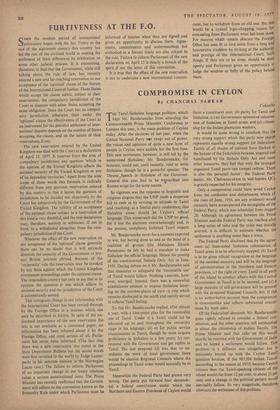FURTIVENESS AT THE F.O.
S INCE the modern period of international 1'arbitration began with the Jay Treaty at the end of the eighteenth century this country has led the rest of the civilised world in seeking the settlement of State differences by arbitration or some other judicial process. It is astonishing, therefore, to find that the Government, while still talking about the rule of law, has recently entered a new and far-reaching reservation to our acceptance of the 'optional' clause of the Statute of the International Court of Justice. Those States which accept the clause admit, subject to their reservations, the compulsory jurisdiction of the Court in disputes with other States accepting the same obligation. Since the Court has no compul- sory jurisdiction otherwise than under the 'optional' clause the effectiveness of the Court as an instrument for the peaceful settlement of inter- national disputes depends on the number of States accepting the clause, and on the nature of their reservations, if any.
The new reservation entered by the United Kingdom was filed with the Court in a declaration of April 15, 1957. It reserves from the area of compulsory jurisdiction any question 'which in the opinion of the United Kingdom affects the national security of the United Kingdom or any of its dependent territories.' Apart from the wide scope of these words this formula is radically different from any previous reservation entered by this country in that it leaves the question of jurisdiction to be decided not objectively by the Court but subjectively by the Government of .the United Kingdom. The validity of an acceptance of the, optional clause subject to a reservation of this kind is very doubtful, and the new declaration may, therefore, amount in substance, if not in form, to a withdrawal altogether from the com- pulsory jurisdiction of the Court.
Whatever the effect of the new reservation on our acceptance of the 'optional' clause generally there can be no doubt that it will seriously diminish the capacity of the Government to pro- tect British interests abroad. Because of the 'reciprocity' rule the reservation may be invoked by any State against which the United Kingdom commences proceedings under the optional clause. The respondent country has only to say that in its opinion the question is one which affects its national security and the jurisdiction of the Court is automatically ousted.
This retrograde change in our relationship with the International Court has been carried through by the Foreign Office in a manner which can only be described as furtive. In spite of the un- doubted importance of the new reservation the• text is not available as a command paper, no information has been released about it by the Foreign Office, and most serious of all, Parlia- ment has never been informed. (The fact that there was a new reservation was noted in the State Department Bulletin but the actual words were first revealed to the world by Judge Lauter- pacht in his separate opinion in the Norwegian Loans case.) The failure to inform Parliament of an important change in our 'treaty relations raises a serious constitutional issue. The Prime Minister has recently reaffirmed that the Govern- ment will adhere to the convention known as the Ponsonby Rule under which Parliament must be informed of treaties when they are signed and given an opportunity to discuss them. Agree- ments, commitments and understandings not embodied in a formal treaty are also subject to the rule. Failure to inform Parliament of the new declaration on April 15 is clearly a breach of the spirit if not the letter of this convention.
It is true that the effect of the new reservation is not to undertake a new international commit- ment, but to withdraw from an old one. But this would be a cynical logic-chopping reason for concealing from Parliament what has been done. For reasons which remain obscure the Foreign Office has seen fit to turn aside from a long and honourable tradition by striking at the authority and prestige of the International Court. Such things, if they are to be done, should be done openly and Parliament given an opportunity to judge the wisdom or folly of the policy behind them.






























 Previous page
Previous page